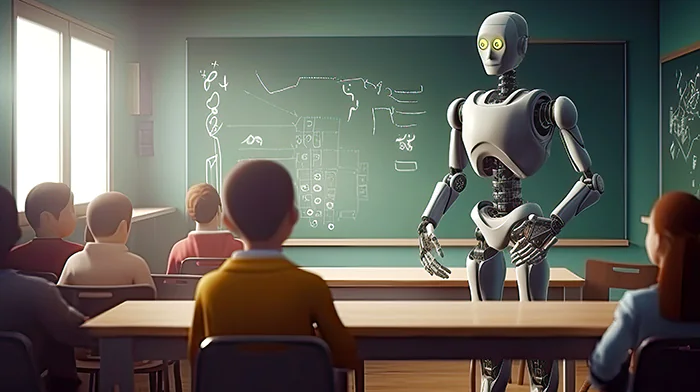Hello!
A high school in London, UK will let students around the age of 15 use AI tools before taking standardized exams next year, despite experts warning that they make for a poor replacement for human teachers.
 As Business Insider reports, David Game College's pilot project is meant to help students who are struggling to keep up — and also, the students far outpacing the others.
As Business Insider reports, David Game College's pilot project is meant to help students who are struggling to keep up — and also, the students far outpacing the others.
"Students will benefit enormously from AI-powered adaptive learning, which allows every student to learn at their own pace rather than having to keep pace with a class," coprincipal John Dalton told BI, "which often progresses too quickly for some students and too slowly for others."
Beyond the face value here — an eyebrow-raising shoehorning of AI tech into education — it's an arguably dystopian temporary solution for the perpetual state of teacher shortages England has been facing for years.
AI hawks will surely promote this as a sign of things soon to come. Yet, given the glaring shortcomings of AI tech and its ever-present tendency to "hallucinate" — a quality that could seriously mess with a student's mind, particularly during their formative years — there's plenty of reason for doubt.
Fortunately, the college won't rely entirely on AI tools. Students in the pilot scheme will get the support of three full-time learning coaches.
 Dalton used already familiar talking points to defend the project, arguing that AI tools will free up teachers and allow students to learn more efficiently. Eerily similar arguments have been made when it comes to companies looking to replace workers with AI.
Dalton used already familiar talking points to defend the project, arguing that AI tools will free up teachers and allow students to learn more efficiently. Eerily similar arguments have been made when it comes to companies looking to replace workers with AI.
David Game College is far from the first to dabble with AI in the classroom. Harvard introduced an AI instructor to teach a popular intro-level coding course. Private school kids in Silicon Valley are also being taught by an AI-powered tutor.
Meanwhile, both students and teachers alike are making ample use of tools like ChatGPT to write and grade papers respectively.
 The trend has already left behind a considerable mess, with students being falsely accused of using AI. Besides, the tech is far from perfect and still can't reliably tell the truth from fiction, a glaring oversight, especially when it comes to education.
The trend has already left behind a considerable mess, with students being falsely accused of using AI. Besides, the tech is far from perfect and still can't reliably tell the truth from fiction, a glaring oversight, especially when it comes to education.
Critics of the college's AI teacher pilot say it's a step too far.
"While AI can be a valuable supplement to live teachers, it cannot replace them entirely," educational consultancy Higher director Hadida Grabow told BI. "We are not seeing anything that could replace a quality educator."
"Regrettably, the technology just isn't there yet — we've seen that with the high-profile failure of the Los Angeles Unified School District's AI chatbot," she added.
 As the LA Times reported last month, AllHere, the maker behind the chatbot that Grabow referenced, notified schools of its "financial collapse" (despite raking in millions of dollars in public funding). The chatbot, which was introduced in March, had significant limitations, often resorting to telling users to "ask your teacher."
As the LA Times reported last month, AllHere, the maker behind the chatbot that Grabow referenced, notified schools of its "financial collapse" (despite raking in millions of dollars in public funding). The chatbot, which was introduced in March, had significant limitations, often resorting to telling users to "ask your teacher."
In other words, we're skeptical of Dalton's claims that the college has "humanized the AI learning process by creating a holistic and engaging educational experience."
"The system does not judge students," he told BI. "Instead, it allows them to learn at their own pace in a safe environment." Whether its efforts, however, will pay off, or aggravate an already critical teacher shortage in the UK, remains to be seen.
Also read:
- How to Optimize Your Facebook Ad Targeting
- The Evolution of Dating Apps
- How do You Choose The Right SEO Agency for Your Campaign?
Thank you!
Join us on social media!
See you!






